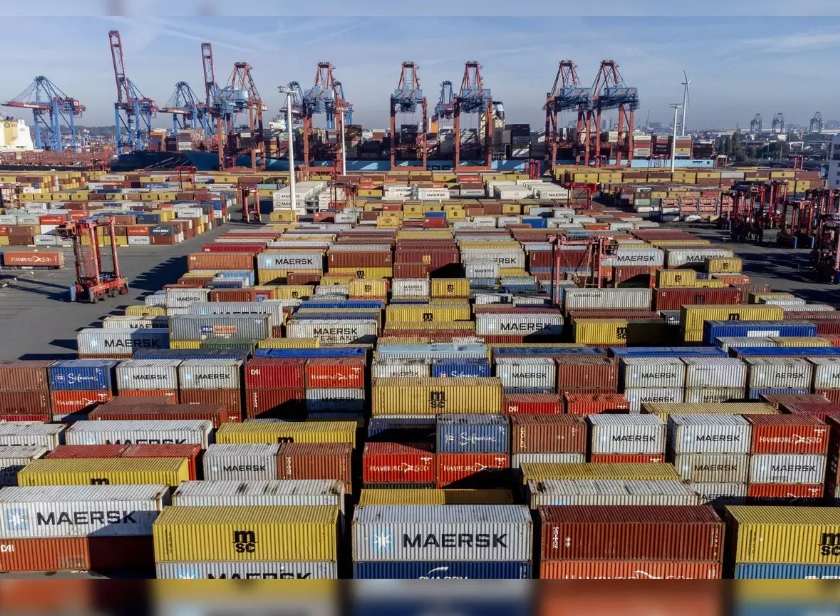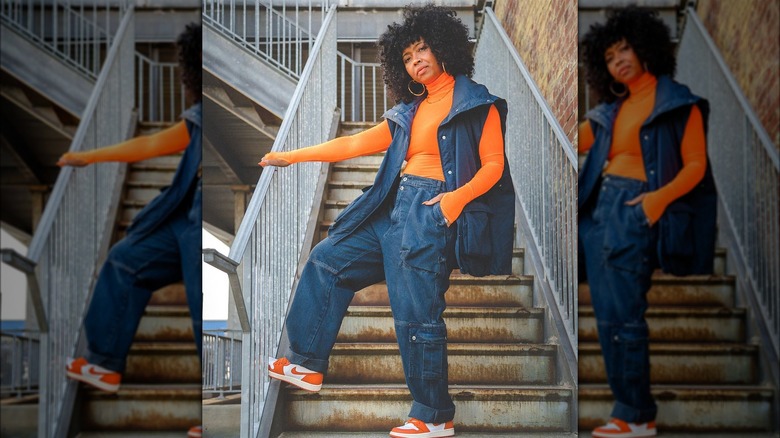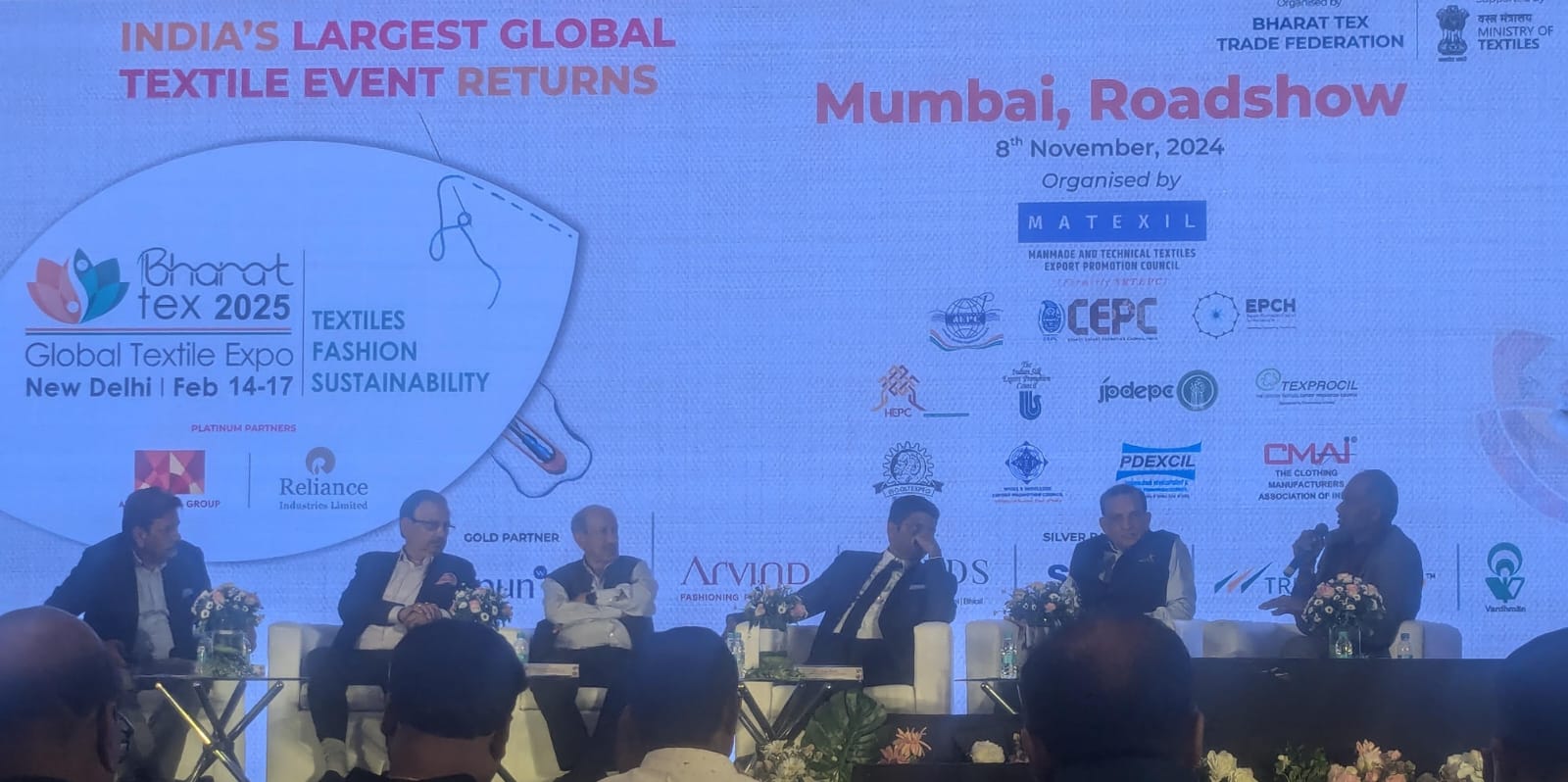FW
After a 10-month delay following the expiration of the previous policy on Dec 31, 2023, the Gujarat government has announced Textile Policy 2024 for the state. Thenew policy introduces key financial incentives that aim to revitalise the textile industry in Surat and across the state.
A major highlight of this policy is the introduction of a 25 per cent capital subsidy for the first time.The policy also reduces the interest subsidy from 5 per cent to 2 per cent. However, the Rs 1 per unit power subsidy has been extended to all textile units. The Gujarat Government also allocates funds worth Rs 1,107 crore to support approximately 5,592 textile units in Surat and other regions.
The capital subsidy offers substantial benefits to textile traders by covering a portion of their investment costs. For instance, if a textile entrepreneur invests Rs 100, the government will provide Rs 40 as a subsidy, reducing the burden of capital expenditure.
Surat has long been renowned for its thriving textile sector, particularly in sarees and dress materials, with products exported across India and internationally. However, despite this success, inadequate infrastructure remains a critical challenge. The city’s ability to scale up and compete globally is hindered by a lack of robust facilities, unlike countries such as China and Bangladesh.
Recognising this need for skilled labor in the city, the Southern Gujarat Chamber of Commerce and Industry (SGCCI) plans to launch a Skill Development Center to train workers in operating modern machinery and improving technical skills. This initiative will help local industrialists focus on garment production, a segment with vast growth potential for Surat’s market.
Bangladesh’s garments export to the US declined by 9.16 per cent Y-o-Y to $4.70 billion in the Jan-Aug’24 period as demand for apparels in the American markets contracted, as per data from the Office of Textiles and Apparel (OTEXA).
The combined apparel and textile (T&A) exports from Bangladesh to the US also lowered by 8.98 per cent Y-o-Y to $4.84 billion during the Jan-Aug’24 period.
OTEXA has recently released its data on apparel and textile import from different countries. The organisation analyses industry data besides being involved in the development of US trade policy. It also participates in trade negotiations and promotion to address trade barriers.

The World Trade Organization (WTO) has released its updated ‘Global Trade Outlook and Statistics’ report, underlining a cautious optimism for global trade. While merchandise trade is expected to rebound in 2024 and 2025, lingering economic and geopolitical uncertainties continue to pose challenges. The WTO has revised its forecast for world merchandise trade growth upwards to 2.7 per cent for 2024, a slight increase from the 2.6 per cent predicted in April. This growth is expected to continue into 2025, albeit at a slightly slower pace of 3.0 per cent.
Report highlights
Modest growth: Global merchandise trade volume is expected to grow by 2.7 per cent in 2024, a slight increase from the previous estimate of 2.6 per cent. This rebound follows a 1.1 per cent drop in 2023, attributed to high inflation and rising interest rates. Growth is projected to further strengthen to 3 per cent in 2025.
Regional variation: Asia is expected to lead the growth in export volumes with a 7.4 per cent increase in 2024, while Europe is projected to see decline of 1.4 per cent. Least developed countries (LDCs) are forecast to see a modest 1.8 per cent growth in exports.
Services trade resilience: Services trade has shown a more robust performance, growing by 8 per cent in the first quarter of 2024. Travel services were a key driver, exhibiting a strong 19 per cent growth in the same period.
Easing inflation: The report notes that inflation has moderated sufficiently by mid-2024, allowing central banks to begin cutting interest rates. This is expected to provide some support to trade growth
Geopolitical risks remain: The WTO highlights that rising geopolitical tensions and increased economic policy uncertainty could negatively impact trade prospects.
Focus on textile and apparel sector
The textile and apparel sector, a significant contributor to global trade, is experiencing mixed recovery. It suggests demand for textiles and apparel is shifting, with increased demand for sustainable and ethically produced products. The sector continues to grapple with supply chain disruptions, with companies seeking to diversify sourcing and build greater resilience. Also, Asia remains the dominant player in textile and apparel production and exports. However, some production is shifting to other regions, including Africa and South America, as companies seek to reduce costs and diversify risks. And online sales of textiles and apparel continue to expand rapidly, creating new opportunities for businesses of all sizes. This trend is particularly pronounced in emerging markets with growing internet penetration.
Table: Regional trade growth projections for 2024
|
Region |
Export volume growth (%) |
Import volume growth (%) |
|
Asia |
7.4 |
6.5 |
|
North America |
2.1 |
1.9 |
|
South and Central America |
1.5 |
1.7 |
|
Europe |
-1.4 |
-2.3 |
|
Africa |
0.8 |
0.9 |
|
LDCs |
1.8 |
2.1 |
The report indicates developed economies facing slowdown and high inflation, are expected to see moderate trade growth. Driven by strong domestic demand and rising incomes, developing economies are likely to experience more robust trade growth. LDCs or least developed economies while facing significant challenges are expected to benefit from increased trade opportunities, particularly in sectors like textiles and apparel.
The WTO report also highlights several challenges and risks to the global trade. The ongoing geopolitical conflicts and trade disputes create uncertainty and can disrupt supply chains. At the same time, unpredictable economic policies and potential trade restrictions can negatively impact investor confidence and trade flows. And extreme weather events and climate-related disruptions could pose a threat to global trade.
Adidas has released preliminary Q3 2024 results, with currency-neutral revenues rising 10 per cent compared to the same period last year. In euro terms, revenues increased 7 per cent to €6.44 billion, up from €5.999 billion in 2023. Excluding Yeezy sales, currency-neutral revenues climbed 14 per cent.
The company’s gross margin improved by 2 percentage points, reaching 51.3 per cent, compared to 49.3 per cent in Q3 2023. Operating profit jumped to €598 million from €409 million in the previous year, aided by around €50 million from Yeezy inventory sales.
Encouraged by this performance, adidas has updated its full-year guidance. The company now expects a 10 per cent growth in currency-neutral revenues for 2024, revising its earlier high-single-digit forecast. Operating profit is projected to reach approximately €1.2 billion, up from the prior estimate of €1.0 billion.
The revised forecast assumes the remaining Yeezy inventory will be sold at cost during Q4, contributing an additional €50 million in sales without further profit impact.
Spring Fair, the UK’s largest home, gift, and fashion trade show, is launching a new ‘Retail Insights’ podcast series ahead of its 75th anniversary. The event, set for February 2-5, 2025, at NEC Birmingham, celebrates the retail industry by sharing stories and expertise from business leaders. The podcast series, hosted by iconic designer Jeff Banks CBE, features interviews with 15 industry figures over 14 weeks starting October 20.
The series, available on platforms like Spotify, Apple Podcasts, and YouTube, was created to give back to the retail community. Featuring topics like brand reinvention, store growth, and business longevity, the discussions aim to inspire and support retail businesses of all sizes.
Spring Fair's Event Director, Soraya Gadelrab, emphasized that the podcast is aimed at retail professionals, catering to both newcomers and established businesses. She highlighted the goal of honoring the community that has shaped Spring Fair, while also offering valuable insights to support retail success.
Jeff Banks praised Spring Fair's legacy, noting its role in the success of his designer collaborations. The first episode features Nick Ronald of Casa Verde, discussing the vital role Spring Fair played in growing his business.
The podcast is designed to offer ‘money-can’t-buy’ insights for retail professionals, helping them thrive in the ever-evolving trade show and retail environment.
eVent Fabrics has partnered with Topo Athletic to supply their eco-friendly eVent Bio Footwear waterproof and breathable laminate. This collaboration integrates eVent Bio technology into Topo’s Terraventure 4 WP trail shoe and Trailventure 2 WP hiking boot, offering comfort, performance, and sustainability.
Chad Kelly, President of eVent Fabrics, highlighted the alignment between the two brands commitment to outdoor activities and environmental responsibility. He noted that eVent Bio Footwear helps maintain high performance while reducing environmental impact.
Designed with plant-based materials, the eVent Bio Footwear laminate provides durability and waterproofing, ideal for rugged outdoor use. The Terraventure 4 WP trail shoe features a secure mesh upper, rock plate, and Vibram Megagrip outsole for superior traction in wet conditions. Meanwhile, the Trailventure 2 WP boot includes a Zip Foam midsole, TPU heel counter, and full-length rock plate for stability, with gaiter attachments for added protection.
This collaboration reinforces both brands dedication to combining sustainability and high-performance outdoor footwear.
With companies including Reliance Industries, Arvind Mills, Vardhaman and Ahuja Textile Mills planning to set up their production units, the upcoming mega textile park in Uttar Pradesh has attracted investment proposals worth over 10,000 crore from domestic textile and garment majors.
In all, over 400 big and small textile manufacturers plan to set up their production and processing plants in the textile park located in the Lucknow-Hardoi districts.
Yogi Adityanath, Chief Minister, Uttar Pradesh, says, the textile hub is estimated to attract a total investment of over 15,000 crore. It would also create 300,000 direct and indirect employment opportunities.
Moreover, the textile park will capitaliseon the disruption in Bangladesh’s textiles sector, following a political upheaval in the country. It will aim to achieve its export target of garments worth $100 billion in the next five years.
Rakesh Saran, Minister of MSME, Khadi and Textiles, UP, says, the textile park will l not only comprise manufacturing and processing units, but also encompass an entire textiles value chain. It will help establish India as a global textile, garment and apparels major.
The facility will also provide training, marketing, designing, packaging, manpower, consultancy and export services.
Traditionally, UP boasts of major textile hubs of Varanasi, Lucknow, Bhadohi and Gorakhpur. The government aims to expand the textile sector as it is one of the largest employment generators in the state. To achieve this, the government has teamed with Raymond to provide skill training to youth in areas of garmenting and tailoring.
Driven by a major merger and a rising demand from rising demand from value-conscious younger consumers, China's secondhand luxury market is undergoing a significant transformation. On Sep 23, 2024 a platform specialising in pre-owned electronics Zhuanzhuan acquired the seven-year old secondhand fashion and luxury e-commerce platform Hongbulin (Plum).
This merger positions Hongbulin to better compete with global players like Vestiaire Collective and The RealReal, both of which have struggled to gain traction in mainland China.
Zhuanzhuan had already invested $100 million in Hongbulin in 2022, and this merger builds on that investment, integrating Hongbulin’s expertise in luxury resale with Zhuanzhuan’s broader platform. While Hongbulin will retain its brand and app, its authentication processes will be folded into Zhuanzhuan’s system, a move aimed at boosting consumer trust—crucial in the secondhand luxury sector.
This merger is part of Zhuanzhuan’s broader strategy to strengthen its position in the highly lucrative secondhand luxury market, projected to be worth over 3 trillion RMB ($420 billion) by the end of 2024. Despite the dominance of platforms like Alibaba's Idle Fish and Zhuanzhuan in the overall secondhand market, the luxury segment remains fragmented, with no clear leader.
While international platforms like Vestiaire Collective have struggled in mainland China, they have performed well in other regions, such as Hong Kong. This challenge may stem from differing consumer motivations: while sustainability is cited as a reason for secondhand purchases, affordability remains the main driver for mainland buyers. These consumers prefer luxury items in near-perfect condition, a preference that has made it difficult for international platforms, which often offer vintage or well-worn goods, to compete.
With China’s secondhand luxury market expected to grow to 217 billion RMB ($30 billion) by 2025, the merger between Zhuanzhuan and Hongbulin could give domestic players an edge. However, broader economic challenges, including inflation and rising unemployment, could impact demand, making it critical for the merged company to navigate these conditions while meeting the evolving needs of value-conscious shoppers.
An American fashion brand, Madewell plans to launch its second collaborative collection with renowned Japanese mill Kaihara.
Inspired by 130 years of the mill’s expertise in the denim industry, the women’s collection incorporates artfully faded washes and heritage details with versatile silhouettes.
Offering an improved version of Madewell’s bestselling overalls-The Oversized Carpenter Overalls, the range offersa relaxed fits and other workwear details like knee patches, cuffable raw hems, a hammer loop and slanted front pockets.
The Rail Straight Jean in the collection has elongated straight legs andfeatures smoothing Magic Pockets in the front. On the other hand, the Super Wide Leg jean is inspired by the ’90s-wide-leg style with cuffed hems. The third, full-length Low-Slung Baggy jean- is worn low with wide legs and raw hems. The collection is currently being sold for $188-$288.
Mary Pierson, SVP-Denim Design, Madewell, says, the jeans in the collection have a strong sense of heritage yet are also very relevant to modern fashion.
Madewell launched its first collection with Kaihara in February this year. The four-piece range included classic workwear staples like a chore jacket and button-down shirt.
A five-day Circular Economy and Textile Exchange Workshop focused on addressing textile waste challenges in Ghana and across Africa concluded in Accra, with calls for sustainable textile management. Organised by the Accra Metropolitan Assembly (AMA) in collaboration with the Africa-Europe Mayors’ Dialogue, the event aimed to foster knowledge exchange on recycling, circular business models, and sustainable textile management.
Beginning on Oct 6, 2024, the workshopbrought together over 100 participants, including policymakers, industry leaders, and advocates from cities such as London, Durban, and Freetown, to explore innovative practices and promote cross-border collaboration.
In his welcome address, Engineer Solomon Noi, Director, AMA Waste Management Department, on behalf of Hon. Elizabeth Sackey, the Mayor of Accra, highlighted the challenges faced in managing secondhand clothing waste in Accra. The city lacks resources to repurpose discarded clothing, despite high volumes of waste, Sackey noted, highlighting plans to implement a circular waste management model in collaboration with international cities by adopting best practices like mechanical recycling and upcycling, Accra’s informal sector, which accounts for 80 per cent of the local economy, could benefit from new jobs in recycling, she emphasised.
Kenji Maghoma, Communications and Production Specialist - External Engagement, Africa-Europe Mayors' Dialogue, explained, the initiative connects over 20 cities across Africa and Europe to find practical solutions to shared challenges. Launched by the Mayors of Freetown and Milan in 2020, the platform focuses on waste management, recycling, and circular business innovation, with the goal of fostering city diplomacy and collaboration.
Addressing the global textile waste crisis, Liz Ricketts, Founder, The Or Foundation, cited the example of the Kantamanto Market in Ghana, which receives 15 million garments weekly. She criticised the categorisation of unsold clothing as ‘charity’ or ‘recycling,’ highlighting the burden it places on local resources. Calling for global accountability, Ricketts advocated for implementation of Extended Producer Responsibility (EPR) policies to align with real waste management costs, helping impacted communities like Kantamanto.
Rachel Singer, Circular Economy Advisor, ReLondon, shared London’s efforts to reduce textile waste, including ambitious targets to eliminate landfill waste by 2026 and increase recycling rates. She emphasisedon ReLondon’s mission to embed circular practices in everyday life and detailed London’s strategy to cut emissions by reducing material consumption.
The workshop included visits to Kantamanto Market and presentations by sustainable fashion designers, aiming to advance policy advocacy for circular textile practices.












